 W
WThe Tokyo Metro is a major rapid transit system in Tokyo, Japan, operated by the Tokyo Metro Co. While it is not the only rapid transit system operating in Tokyo, it has the higher ridership among the two subway operators: in 2014, the Tokyo Metro had an average daily ridership of 6.84 million passengers, while the other system, the Toei Subway, had 2.85 million average daily rides.
 W
WThe Tokyo Metro 01 series was an electric multiple unit (EMU) train type operated by the Tokyo subway operator Tokyo Metro on the Tokyo Metro Ginza Line subway in Tokyo, Japan, from 1983 until March 2017. A total of 38 six-car trainsets were built between 1983 and 1997 in five batches, and the design received the 25th Laurel Prize of the Japan Railfan Club in 1985.
 W
WThe Tokyo Metro 02 series is an electric multiple unit (EMU) train type operated since 1988 by Tokyo Metro on the Tokyo Metro Marunouchi Line subway in Tokyo, Japan. Its design is based on the Tokyo Metro 01 series.
 W
WThe Tokyo Metro 03 series was an electric multiple unit (EMU) train type operated by the Tokyo subway operator Tokyo Metro in Tokyo, Japan. A total of 42 eight-car trainsets were built, between 1988 and 1994, entering service on 1 July 1988.
 W
WThe Tokyo Metro 05 series is an electric multiple unit (EMU) train type operated on the Tokyo Metro Tozai Line and Tokyo Metro Chiyoda Line Ayase Branch in Japan by the subway operator Tokyo Metro. Some sets have also been shipped to Indonesia, where they operate on the KAI Commuter Jabodetabek system in Jakarta.
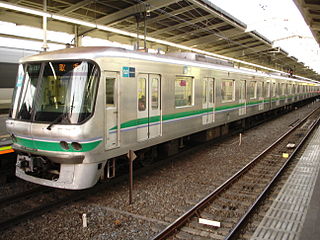 W
WThe Tokyo Metro 06 series was an electric multiple unit (EMU) train formerly operated by the Tokyo subway operator Tokyo Metro on the Tokyo Metro Chiyoda Line in Tokyo, Japan, from 1993 until 2015.
 W
WThe Tokyo Metro 07 series is an electric multiple unit (EMU) train type operated by Tokyo Metro in Tokyo, Japan. Introduced into service in 1993, a total of six 10-car sets were manufactured by Kawasaki Heavy Industries and Nippon Sharyo between 1993 and 1994 for use on the Tokyo Metro Yūrakuchō Line. From 2006, the sets were permanently transferred to the Tokyo Metro Tōzai Line to replace ageing 5000 series trainsets.
 W
WThe Tokyo Metro 08 series is an electric multiple unit (EMU) train type operated on the Tokyo Metro Hanzōmon Line in Tokyo, Japan since 2003. Introduced into service on 1 July 2003, a total of six ten-car trainsets were manufactured by Nippon Sharyo between 2002 and 2003 to augment the 8000 series trains following the extension to Oshiage.
 W
WThe Tokyo Metro 1000 series is an electric multiple unit (EMU) train type operated by the Tokyo subway operator Tokyo Metro in Japan on the Tokyo Metro Ginza Line since April 2012.
 W
WThe Tokyo Metro 2000 series is an electric multiple unit (EMU) train type on order by Tokyo Metro for use on the Marunouchi Line in Tokyo, Japan. They will replace the Tokyo Metro 02 series currently in service on the Marunouchi Line.
 W
WThe Tokyo Metro 5000 series is an electric multiple unit (EMU) train type first built 1964, which operated as 3-car sets on the Tokyo Metro Chiyoda Line branchline in Tokyo, Japan until 2014. 10-car sets were used on the Tokyo Metro Tōzai Line until March 2007. Set 5109,5816,5817 have also been shipped to Indonesia, where they operate on the Kereta Commuter Indonesia system in Jakarta.
 W
WThe Tokyo Metro 6000 series is an electric multiple unit (EMU) train type operated by the Tokyo subway operator Tokyo Metro on the Tokyo Metro Chiyoda Line in Tokyo, Japan from 1971 to 2018. A number of trainsets have been exported to Indonesia for use by Kereta Commuter Indonesia following their withdrawal in Japan.
 W
WThe Tokyo Metro 7000 series is an electric multiple unit (EMU) train type operated by the Tokyo subway operator Tokyo Metro in Tokyo, Japan, since 1974. The design is based on the earlier Tokyo Metro 6000 series trains used on the Tokyo Metro Chiyoda Line.
 W
WThe Tokyo Metro 8000 series is an electric multiple unit (EMU) train type operated by Tokyo subway operator Tokyo Metro on the Tokyo Metro Hanzomon Line in Tokyo, Japan. since 1981.
 W
WThe Tokyo Metro 9000 series is an electric multiple unit (EMU) train type operated by the Tokyo subway operator Tokyo Metro on the Tokyo Metro Namboku Line in Tokyo, Japan, since 1991.
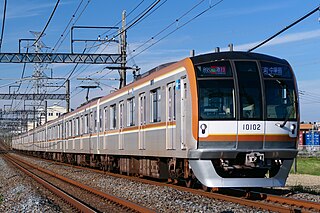 W
WThe Tokyo Metro 10000 series is an electric multiple unit (EMU) train type operated on the Yurakucho and Fukutoshin subway lines of Tokyo Metro in Japan since 2006.
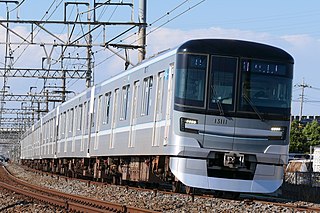 W
WThe Tokyo Metro 13000 series is a Japanese DC commuter electric multiple unit (EMU) train type operated by the Tokyo subway operator Tokyo Metro on Tokyo Metro Hibiya Line and Tobu Skytree Line inter-running services. Introduced into service on 25 March 2017, a total of 44 seven-car sets were built by Kinki Sharyo between 2016 and 2020 to replace the 03 series fleet.
 W
WThe Tokyo Metro 15000 series is an electric multiple unit (EMU) train type operated by Tokyo subway operator Tokyo Metro on the Tokyo Metro Tozai Line in Tokyo, Japan, since May 2010.
 W
WThe Tokyo Metro 16000 series is an electric multiple unit (EMU) train type operated by the Tokyo subway operator Tokyo Metro on the Tokyo Metro Chiyoda Line in Tokyo, Japan, since November 2010.
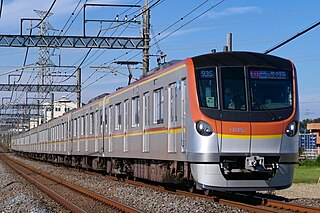 W
WThe Tokyo Metro 17000 series is a Japanese DC electric multiple unit (EMU) commuter train type operated by Tokyo Metro on the Yūrakuchō Line and Fukutoshin Line to replace the ageing Tokyo Metro 7000 series. It entered service on 21 February 2021.
 W
WThe Tokyo Metro 18000 series is an electric multiple unit (EMU) train type operated Tokyo Metro on the Hanzomon Line in Japan. Introduced into service on 7 August 2021, a total of 19 ten-car trainsets are being manufactured by Hitachi Rail from 2020 to replace the ageing Tokyo Metro 8000 series currently in service on the Hanzomon Line.
 W
WF Liner (Fライナー) is the name for the fastest through service train among five railway companies: the Tobu Railway, Seibu Railway, Tokyo Metro, Tokyu Corporation and Yokohama Minatomirai Railway.
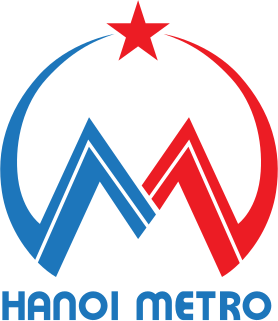 W
WThe Hanoi Metro is a rapid transit system in Hanoi, the capital city of Vietnam. It is Vietnam's first rapid transit system.
 W
WNoritsugu Hayakawa was a Japanese businessman. He is renowned for funding the construction of Japan's first subway system, now known as the Tokyo Metro Ginza Line, which opened in 1927.
 W
WThe S-Train is a reserved-seat Commuter Liner train service operated mainly by Seibu Railway, along with Tokyo Metro, Tokyu Corporation, and Yokohama Minatomirai Railway.